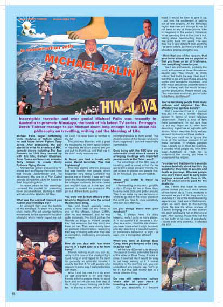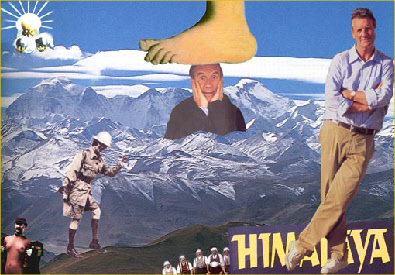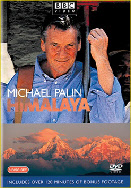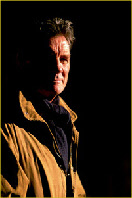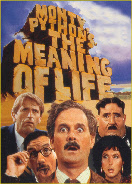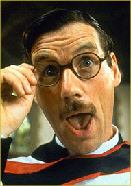Derek Tickner
© 2016 Derek Tickner

Michael Palin began performing while studying at Oxford, where he met future fellow Python Terry Jones. After graduating the pair wrote for a variety of BBC comedy shows including The Two Ronnies. In 1969 they teamed up with Eric Idle, Graham Chapman, John Cleese and American animator Terry Gilliam to create Monty Python's Flying Circus.
Michael has written and acted and in TV shows such as Ripping Yarns and films such as Jabberwocky and The Missionary. His role in A Fish Called Wanda earned him a BAFTA Award for Best Supporting Actor. He has cornered the market for presenting travel documentaries, starting in 1989 with Around the World in 80 Days.
What was the scariest moment you had on your Himalaya trip?
An ultralight flight over the foothills of the Himalaya. In effect it’s a flying chair, really. I was squeezed in behind the pilot, held in by just one lap strap. Off we went into the air, higher and higher, and I felt incredibly terrified and vulnerable. We did strange banking movements for the camera in the other ultralight, which nearly tipped me out. Oh God! I’ve never been so terrified in my life!
The pilot was Russian, with a great big moustache, he didn’t speak English or Nepalese. He’d turn around and grin and put his thumb up, and that was it. He didn’t really reassure me. Though once I got used to it, especially once we started to go down, it was absolutely wonderful.
In Nepal you had a brush with some Maoist terrorists. Was that frightening?
That was slightly different, because that was hostility from people. Which happened very rarely, generally the people are so friendly and so hospitable and so open. It was very odd when the Maoists infiltrated the village: the villagers suddenly became cowed, wouldn’t look us in the eye and seemed to resent our presence. We got out of there fairly quickly.
You were with British officers of the Ghurkha Regiment, who the armed Maoists took away?
Yes, and they’d specially come along to look after us! We talked to one of the officers, Adrian Griffith, after he was released and he was quite diplomatic. He didn’t portray the Maoists as thugs or violent people. They had weapons, but they didn’t use them on him. They were mainly keen on political indoctrination, explaining their way of dealing with what they saw as corruption, inefficiency and poverty in Nepal. They have a lot of influence over the rural areas, but not in the capital Kathmandu, where everything happens. The whole episode was interesting. And quite alarming.
They didn’t try and turn Adrian into a Maoist stooge while they had him for those few days?
No, but they wanted him to tell the world that they aren’t a bad lot. They weren’t threatening us as foreigners at all. They were at pains to point out that they were very happy for tourists to come to the country. But they wanted foreigners to understand their cause, as against the government’s view.
How do you deal with fear when you’re in a tight spot in a far from home?
There’s nothing much you can do, really. In the case of the ultralight flight I just hung on and hoped for the best! I’m generally an optimistic traveller, I usually feel that if I’m with people who respond in some way, I feel comfortable with them.
What I and the crew try to do when we get anywhere is try and make friends with the people there, to stand back and not intrude into their way of life. That’s important, to make contact. It might mean drinking yak butter tea, or sharing a joke, which is often incomprehensible to both sides! That disarms some of the danger, and once that’s happened I can feel reasonably comfortable.
You have the facial expressions and mannerisms of a friendly kind of chap.
Well yes. I don’t go around with my defences up, I go with an open spirit.
You travel with your film crew. When you arrive at a location, do you start filming straight away?
If possible we get to know the people and observe their way of life, and then decide exactly what we want to film. We certainly don’t go in there with cameras whirring. Unless it’s somewhere public like the streets of a capital city, that’s usually OK.
Does being with the BBC give you substantial clout when it comes to arranging meetings with important people such as the Dalai Lama?
The advantage of the BBC way of travelling (with a crew) is that it’s like going with a small group of friends. You get access to places and people that, as an individual, you wouldn’t get to. Also there’s a streak of laziness in me, I wouldn’t bother to do half of the things I do if we weren’t making a television programme. I’m pushed into doing things that, in the end, I generally end up enjoy doing.
Would you prefer to travel by yourself?
I like travelling on my own, I go off to a city in Europe for two or three days, take my note book and potter around. Then I can make my own decisions on where to go. But in the wilder places of the world, to get there and operate there, you have to know somebody who can look after you. A walk around Adelaide, that’s fine, you can do that on your own. I love to sit in a café for an hour or so and just watch the world go by, soaking up the atmosphere and local culture. I enjoy that voyeuristic pleasure.
Do you travel with your notebook?
Yes, I always have. It’s diary keeping, really. I go to so many places, if I’m not careful it all becomes a blur. Also, as a writer, I like little bits of detail, you never know when it might be useful one day: a particularly beautiful little house, someone’s behaviour or a sign I’ve seen. I scribble it all down, I’m a bit anally retentive, I suppose. I’m probably just a trainspotter!
I take photographs wherever I go for the same reasons. Do you take photos?
Not much, I’m so overwhelmed by photographic support! I’ve got the best film cameraman in the BBC, Nigel Meakin. We’ve also got Basil Pao, one of the best stills photographers I know, they do it all for me. Occasionally I get my camera out and take rather sad little pictures of my own. But if I was on my own, I’d take many more pictures.
When I take photographs on my travels, I’m in a dilemma as to whether to take a candid photo to capture the moment, but risk offending the subject. Or if I ask permission, people often freeze and you lose that spontaneity.
I think you’ve got to be very aware of that. I noticed that our film cameraman didn’t have any problems as he shot, I never saw him being shouted at. But on a few occasions people took exception to Basil, our stills photographer. I think that’s because a stills camera has a long lens which is aimed at people and makes a ‘snap’ sound when you shoot. Whereas the film camera is on Nigel’s shoulder, it’s part of his head almost, with no long lens sticking out, people don’t seem to be threatened by it.
When you were at Everest Base Camp, were you tempted to be carry on to the top?
I felt the lure of Everest quite strongly. The peak of Everest dominates the end of the valley at Base Camp, it looks so close, it seemed like it would be easy to just keep walking up it! It looked tempting in the morning sun, you can understand why people say, ‘Let’s go for it’. But that last 10,000 feet is a whole different thing.
I think I’m less competitive these days, it didn’t particularly worry me that we couldn’t get to the top. Mountains over 15,000 feet are very hostile places: there’s not much air, you’re movements are slower, you get headaches. The signal that’s being sent out is, ‘don’t bother!’
Do you still experience culture shock after all your years of travelling to remote places?
Oh yes, absolutely. If I became blasé it would be time to give it up. I just love
the excitement of getting out at new airports. All the Himalaya region was new and
strange to me, I’d not been to any of those places. Like in Nagaland in the eastern
Himalaya. To be spending time in the chief’s hut, talking about head-
I think that one of the reasons that your travel shows are so popular is that you have that air of freshness, that everything’s new for you.
Yes, I am enthusiastic, probably too much enthusiasm at times. Sometimes people say,
‘You should be more critical,’ but that’s the way I feel. And I feel that to go and
see these amazing sights and wonderful countries and then moan about how uncomfortable
it is to be there: well, that would be very counter productive. People would say,
‘You miserable so-
You’ve met many people from many cultures and religions. Has this affected your spiritual beliefs?
Well, I suppose it has in a gradual way. In the Himalaya region there’s Islam, Sikhism, Buddhism, Christianity, they’re all there, you compare and contrast the various religions.
I’m not a terribly religious person in terms of overt religious observation. There’s a kind of faith there somewhere, I’m not sure how I’d put my finger on it, other than describing myself as an agnostic with doubts. Which describes fairly well my sense of confusion on these matters.
What you can’t do is ignore the force of the spiritual element in all these societies. It shapes peoples lives. Literally so in Tibet, for example, it dictates what people do, what they wear…Buddhism is Tibet. So to understand the country you have to understand the religion.
I’ve observed that travellers seem to be more fatalistic about the life’s big questions, they tend to see life and death as journeys.
Yes, I think that travel to remote places makes you much more aware of how harsh life is. Mortality is accepted as part of life, they don’t try and deny it.
One of the most interesting experiences I has was at Kathmandu, we went down to the burning ghats. We saw the whole process of a family bringing one of their women folk down and laying her on the funeral pyre. After various rituals they set fire to her body in full view of everybody. I found that very powerful, it affected me quite a lot.
We don’t do the same in our society. We have people in suits, men we don’t know, taking charge of everything. The body is dealt with by them, a button is pressed, and it disappears. This was their family doing this, they were making sure that the remains were dealt with by the family itself. It was personal and meaningful for them.
Moving deftly from death to comedy: who has influenced you as a comedian?
Peter Sellers for the range of characters he played, I enjoy character comedy rather
than stand-
Spike Milligan has the energy, the madness, the willingness to take a risk, the disrespect of convention. I love all that, it was really bracing when I was a schoolboy.
Peter Cook had a great facility for writing this wonderful, creative material. He was a big influence, for the first time you were able to tilt at the establishment from within.
I grew up after the war, when the country was in a state of orthodoxy. After two world wars and the depression, it was hard to kick the old lady. Queen and country meant a lot, we still had the empire. In the sixties that began to fall apart, it was inspiring to know that these sacred cows could be judged on their own performance. If you felt that they weren’t working, then you could say so through comedy.
How did you go from being a comedian and writer to doing travel shows?
Python did a lot of good comedy, but once the team decided that there was nothing new to do after The Meaning of Life, I wasn’t particularly drawn to doing another comedy series. I did a lot of acting in various films, the last of which was A Fish Called Wanda.
It was after Fish that a man from the BBC came along and said they had an idea to send someone around the world in 80 days. Something about going around the world appealed to my love of travel and curiosity about places. I said OK, I’ll have a go. That led on to the other travel series, I had to give up acting. But I found I got a lot more satisfaction out of these journeys than sitting in a caravan all day waiting to shoot one scene at six o’clock in the evening.
Do you know why they chose you in particular?
Well, I wasn’t the first choice. Three others had been asked, and they’d all said no. At the top of the list was (globetrotting British TV commentator) Alan Whicker. I’d done one serious documentary on railways in 1980. So the guy who’d had the idea for 80 Days must have remembered that, and thought, ‘Palin’s not a fool and can do documentaries reasonably seriously.’ The BBC never told me why, they make these decisions in their own exalted style. I just said yes anyway.
Michael Palin
The incorrigible and genial globetrotter Michael Palin was recently in Australia to promote Himalaya, the book of his latest TV series. Derek Tickner managed to pin Michael down long enough to discuss travelling, writing and the Meaning of Death.
